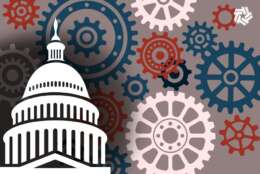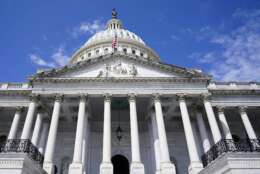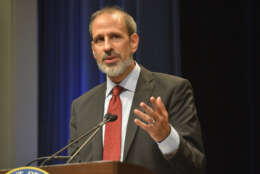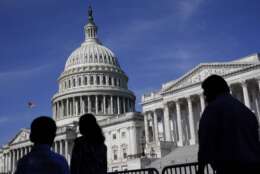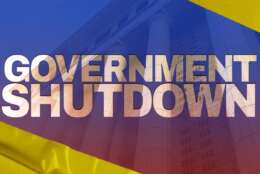Budget
-
The latest continuing resolution Congress passed last week avoided a government shutdown. But even if lawmakers achieve that feat again next year, on the two different dates when the CR expires, there are a lot of other ways the rest of fiscal 2024 could be messy for federal agencies and their vendors. To look into it further, Federal News Network Deputy Director Jared Serbu talked with Larry Allen, President of Allen Federal Business Partners.
November 21, 2023 -
The government is open on this short holiday week – and it will stay that way through at least the first couple months of the new year. That is thanks to a continuing resolution Congress passed and the president signed late last week. But the way Congress went about it is going to make things complicated – and maybe harder to pass full appropriations bills for 2024. For more on this, Federal News Network Deputy Editor talked with Mitchell Miller, WTOP Capitol Hill correspondent.
November 20, 2023 -
On today's Federal Newscast: The Defense Department is still the only federal department that's never earned a clean audit opinion. GOP lawmakers are trying to override a controversial cybersecurity regulation. And locality pay strikes again, as more than 33,000 federal employees will see additional raises in January.
November 17, 2023 -
Mike McCord, the undersecretary of defense (comptroller)/chief financial officer, said the Department of Defense will be impacted by more continuing resolutions, particularly if it leads to a sequestration, but it will not furlough personnel if that happens
November 16, 2023 -
Among the recent inductees to the National Academy of Public Administration, is a former state budget official. For how the federal government looks from a state point of view, Federal Drive Host Tom Temin spoke with that official, Shelby Kerns, who is now the Executive Director of the National Association of State Budget Officers.
November 13, 2023 -
It sure came fast. Just a workweek remaining until the continuing resolution expires. The fever is building on Capitol Hill to do something to avoid a government shutdown. For the latest, Federal Drive Host Tom Temin spoke to Bloomberg Government Deputy News Director Loren Duggan.
November 13, 2023 -
House Speaker Mike Johnson has unveiled his proposal to avoid a partial government shutdown next weekend by extending government funding for some agencies and programs until Jan. 19 and continuing funding for others until Feb. 2.
November 11, 2023 -
In today's Federal Newscast: The EEOC swears in a new general counsel, who happens to be blind. DoJ has launched a new online tool to inform attorneys about pro bono opportunities. And GSA is planning a new service to make paying for travel and expenses easier across the federal government.
October 24, 2023 -
Both open and closed seasons are coming up. November 17 will mark the end of the continuing resolution, so the government could close when the money runs out. Just a few days earlier, open season arrives. That is when federal employees choose a health insurance carrier for 2024. For the rundown on all of this, Federal Drive Host Tom Temin spoke with John Hatton, of the National Active and Retired Federal Employee Association (NARFE).
October 13, 2023 -
The continuing resolution, which lasts until November 17, takes a six-and-a-half week bite out of fiscal 2024's calendar. In a sense, it resets the countdown to a government shutdown, especially if House Republicans succeed in ousting Speaker Kevin McCarthy, which, in case you hadn't heard...happened. Contractors have been sorting out what it all means. For an update, Federal Drive Host Tom Temin spoke with Stephanie Kostro, the Executive Vice president for Policy at the Professional Services Council.
October 04, 2023 -
To the surprise of just about everybody, the Federal Government is fully functional this Monday, October 2, 2023. Some surprise last-minute votes in both the House and Senate on Saturday happened just in time to get a continuing resolution (CR)to the president’s desk – just hours before much of the government was set to run out of appropriations.
October 02, 2023 -
Managing, consolidating, and interpreting vast and intricate data is paramount in the complex labyrinth of federal budgeting. Yet, an undeniable challenge lurks in the shadows: the obstacle posed by disparate systems and data silos.
October 02, 2023 -
Former federal executives say taking care of employees' emotional highs and lows during the preparation for a government shutdown is just as important as the operational aspects of contingency planning.
October 01, 2023 -
How often have you heard it said: The census count determines how much federal money a state, county or city will get. Data analysis by the Project on Government Oversight (POGO) shows that supposition is not quite as simple as it sounds. For more, Federal Drive Host Tom Temin spoke with POGO senior policy analyst Sean Moulton.
September 28, 2023 -
Here’s how many feds would stay on the job – both with and without pay – during an upcoming shutdown
65% of the overall civilian workforce would keep working though a shutdown, but hundreds of thousands would receive no pay, according to agency shutdown plans.
September 26, 2023

